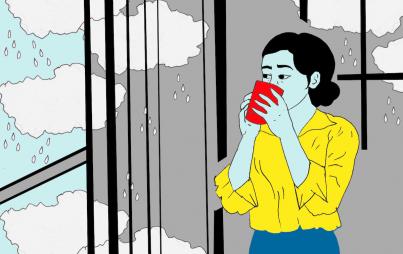
I want to feel and share deeply, intimately. I can’t admit any of this out loud. Image: Thinkstock.
Content notice: sexual abuse.
During a recent session, my therapist pointed out there’s a huge discrepancy in the way I present myself.
On the one hand, I am a successful working person who seems fine and normal. On the other hand, I have a hard time with basic self-care and very often experience dissociation, depression, and anxiety as a result of sexual trauma and PTSD.
And between these seemingly different people is a huge gap occupied by denial.
Denial is my survival skill. If I can keep running just fast enough to keep on top of the bare minimum — work, deadlines, appointments, cats — then I’m winning.
Sure, I’m turning my wheels in place and dodging emotions and human connection like it’s my job, but at least I give the illusion of participating in the world. Can’t that be enough?
Letting go of denial feels like giving up, and I am not a quitter.
But recently I find myself less and less able to deny that trying to pretend I'm not struggling is preventing me from fully healing.
I want to be courageous and daring in recovery with my whole heart, but I am afraid to engage in the process. These memories and feelings are more than half a lifetime old. I should be over this by now.
When I am crawling out of my skin or lying despondent on the floor, I can’t find words to explain why I’m so anxious or depressed. The reasons bounce just out of reach of my conscious thoughts. But though I am unable to give voice to my emotions, they nevertheless clutter up the background like swooping Dementors.
I can’t tolerate sitting still. I am afraid of the pent-up memories, lingering like ghosts.
I refuse to acknowledge I feel anything at all.
Digging even deeper, I know something closer to the truth: a long list of unmet needs.
Wanting to feel loved, special, and cared about. Neediness and the desire to be rescued, still, after all these years. I long for deep human connection and my soul aches with loneliness for a different way of living. For warm hugs, lingering kisses, and quiet fireside chats.
I want to feel and share deeply, intimately.
I can’t admit any of this out loud.
The self-hate and isolation I impose on myself only replicates the abuse I’ve already been through. I will not be party to my own abuse anymore.
It feels to me like there is something dirty and wrong about wanting connection. Intellectually, I know it’s because the need to feel special and cared-about was a factor in my falling into an abusive situation in the first place. The sexual abuse also taught me my body is a tool for others’ pleasure and the only path to a warm hug was an unwanted sexual act.
I survived by shutting down the impulse to reach for people.
Now, giving up my crusade to go it alone and muscle through the ugly lurking beneath my surface cuts too close to letting my abuser win. I can’t let that happen.
I feel just as powerless now as I did then.
♦♦♦
Just disclosing and discussing a small portion of my abuse in a single therapy session knocked me flat for weeks. I’m not eager to jump back in and deal with my entire history.
The pervasiveness of the sexual abuse on my body, mind, and life is breathtaking.
I am terrified to admit how deeply trauma has affected me, and the long, hard road of recovery still ahead of me. I feel haunted. I can’t shake the feeling, no matter how often I show up for work or how many deadlines I meet.
Denial may be a survival skill, but survival isn’t enough anymore. I owe it to myself to reclaim my life and live out loud — live like I matter. I’ve been punished enough, and to keep denying the hard emotions and memories impedes my recovery.
The self-hate and isolation I impose on myself only replicates the abuse I’ve already been through. I will not be party to my own abuse anymore.
I want to trade fear, running, and hiding for courage, hope, and resilience.
Therapist Wendy Ann Wood, in her book Triumph Over Darkness: Understanding And Healing The Trauma Of Childhood Sexual Abuse, outlines 15 stages of recovery, including everything from telling your story to identifying coping skills to dealing with anger, confronting the offender, and ultimately realizing peace within.
Stage 2, Acknowledgment of Issues — “when you realize there’s a problem but you seem unable to deal with what is happening in your life” — seems all too familiar.
I can’t pretend this isn’t happening anymore. I’m at an unsustainable turning point in my recovery. I have to close the gap between the denial I’m trying so hard to maintain and the reality of my mental health symptoms.
And that starts now, by acknowledging and accepting that I need help.
As Robert Frost said in his poem, “A Servant to Servants,” “The best way out is always through.”







